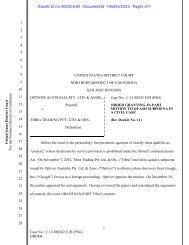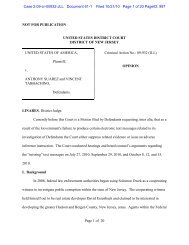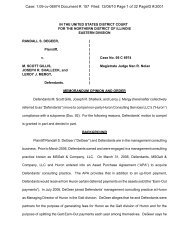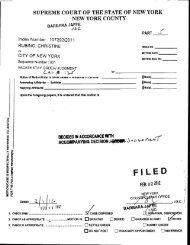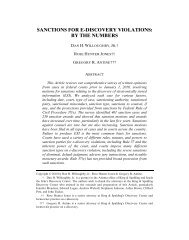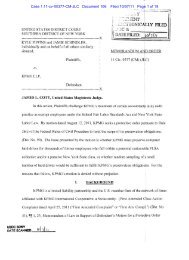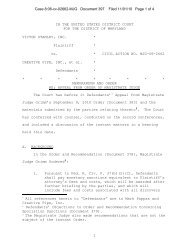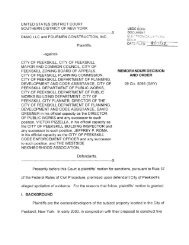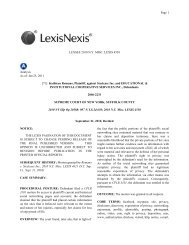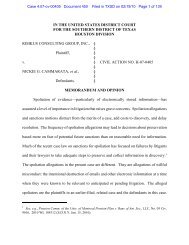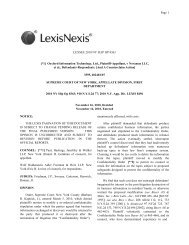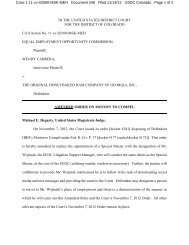Katiroll Company, Inc. v. Kati Roll and Platters - E-Discovery Law Alert
Katiroll Company, Inc. v. Kati Roll and Platters - E-Discovery Law Alert
Katiroll Company, Inc. v. Kati Roll and Platters - E-Discovery Law Alert
You also want an ePaper? Increase the reach of your titles
YUMPU automatically turns print PDFs into web optimized ePapers that Google loves.
2011 U.S. Dist. LEXIS 85212, *<br />
Page 4<br />
2 Further, the Court notes that it may even be<br />
somewhat misleading to have printouts of Defendant's<br />
posts with the infringing picture, as if<br />
they always appeared that way. Indeed, it is likely<br />
that many posts existed for a substantial portion of<br />
their lifetime without the allegedly infringing<br />
photograph. This is an issue that can be resolved in<br />
the proper questioning of witnesses.<br />
Given these considerations of fault, the Court determines<br />
that a less imposing alternative is the best solution.<br />
Mr. Jivani must to coordinate with Plaintiff's counsel to<br />
change the picture back to the allegedly infringing picture<br />
[*12] 3 for a brief time so that Plaintiff may print whatever<br />
posts it thinks are relevant - such action shall not be considered<br />
an additional act of infringement. The Court<br />
however, determines that it is incumbent on Plaintiff to,<br />
during the appointed time, print such posts as it thinks are<br />
necessary to make its case. Thereafter, Mr. Jivani must<br />
immediately change his profile picture back to his noninfringing<br />
picture.<br />
3 These photographs have not been destroyed,<br />
they been attached in several PDFs to this Court. It<br />
would be a simple process to recover the photograph<br />
from those PDFs. Then, Plaintiff may print<br />
the posts it thinks are relevant to the case.<br />
3. Documents from Defendants' Website<br />
Plaintiff complains that it does not have a copy of the<br />
Defendants' website showing what the restaurant looked<br />
like prior to its repainting. Defendants respond that<br />
Plaintiff is in possession of pictures showing the restaurant<br />
prior to repainting, which are sufficient for Plaintiff<br />
to make its case. Again, the first, third, <strong>and</strong> fourth elements<br />
of the test are met. The question revolves around<br />
the second element, whether such evidence was destroyed<br />
intentionally or negligently, <strong>and</strong> what prejudice accrued to<br />
[*13] Plaintiff as a result.<br />
Essentially, this is Plaintiff's complaint about Defendants'<br />
repainting prior to the inspection again. As<br />
discussed, Plaintiff had the opportunity to take pictures<br />
<strong>and</strong> video of the restaurant with a minor change. The<br />
Court does not know whether Plaintiff took advantage of<br />
that opportunity but, as discussed, the minor change in<br />
appearance was not very prejudicial to Plaintiff (particularly<br />
in light of the fact that Plaintiff has maintained that<br />
the gold color of the test patches is similar to the original<br />
orange). Consequently, Plaintiff suffered minimal prejudice.<br />
However, the Court concludes that it is implausible<br />
that Mr. Jivani has no other electronic copies of these<br />
pictures on his hard drive or in emails to his web developer,<br />
etc. As such, Mr. Jivani is directed to search his<br />
home computer <strong>and</strong> any other computers he frequently<br />
uses <strong>and</strong> disclose any pictures he has of the restaurant<br />
prior to its repainting. The Court directs Defense counsel<br />
to remind Mr. Jivani of the consequences of destroying<br />
evidence before a tribunal.<br />
The Court also determines that, without the printout<br />
of the website, the evidence will be insufficient to show<br />
that the website itself embodied [*14] pictures of the<br />
infringing restaurant <strong>and</strong> substantial prejudice has accrued<br />
to Plaintiff's ability to show that website itself infringed its<br />
trade dress. As such, on this limited issue, the Court will<br />
grant a spoliation instruction unless Defendants produce<br />
an image of the portion of the website that included the<br />
photographs within one week of the order accompanying<br />
this opinion.<br />
4. Annual Report<br />
Plaintiff claims that a spoliation inference should<br />
result from Defendants' failure to provide its 2010 annual<br />
report. Plaintiff requested the report to confirm Defendants'<br />
representation that Rasik Jivani was no longer a<br />
shareholder of the corporation because he had transferred<br />
the stock to Niraj Jivani. Defendants claimed that they<br />
were unable to produce the report because it was no<br />
longer in their possession, despite the fact that they filed it<br />
during the pendency of this litigation. (See Doc. No. 59,<br />
Ex. A, p. 1). Defendants did provide documents related to<br />
the transfer of stock <strong>and</strong> stock certificates <strong>and</strong> corporate<br />
bylaws. (Defs.' Br. at 12).<br />
It does appear that Defendants were at the very least<br />
grossly negligent in failing to keep a copy of a report that<br />
they agreed to provide to opposing [*15] counsel <strong>and</strong> the<br />
Court. Mosaid Techs., 348 F.Supp.2d at 336 ; (See Doc.<br />
No. 57-1, 3). However, apparently this is a public<br />
document available from the New Jersey Secretary of<br />
State. As a result, the Court cannot see any prejudice that<br />
accrues from the failure to produce it - it is still available<br />
to both parties.<br />
Indeed, the Court observes that it would have been<br />
easier for Plaintiff to request the filing than to draft this<br />
portion of the motion. The Court further observes that it<br />
would have been easier for Defendants to request the<br />
filing than to respond to this portion of the motion. Given<br />
the lack of prejudice to Plaintiff, the Court finds that a<br />
spoliation sanction is inappropriate, despite Defendants'<br />
fault in not preserving their copy of the report. See<br />
Kounelis, 529 F. Supp. 2d at 519.<br />
However, counsel for Defendants is directed to request<br />
the report from the Secretary of State <strong>and</strong> provide it<br />
to Plaintiff if it has not already so provided.<br />
5. Emails Between Mr. Jivani <strong>and</strong> the Web Developer



